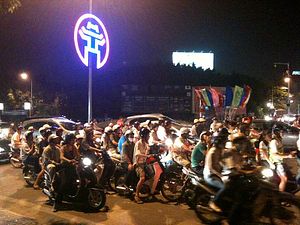Traffic has emerged as among the top issues confronting Southeast Asians cities over the past few years. With the accumulation of wealth has come the hunger for large and/or expensive cars. That has naturally created greater congestion in the streets, and often times bigger problems for governments.
Vietnamese urban planners in the Hanoi People’s Council appear to have had enough. They have announced a ban on motorbikes by 2030, a move which is supposedly expected to ease traffic jams and limit accidents on the city’s roads.
“Some 70 percent of traffic accidents are related to motorbikes, which proves that motorbike drivers are those at the highest risk of road accidents,” said deputy Nguyễn Tiến Minh.
The council also says it will improve public transport, with half of the city’s seven million people expected to use it in thirteen years as opposed to the current 12 percent.
But, as the British broadcaster, the BBC, noted, residents are doubtful that this will actually take off. Indeed, even the government friendly presses are casting the odd doubt over the reasoning of the people’s council.
Critics argue that, among other things, surveys conducted by officials in Hanoi to support their plan were shoddy.
Hanoi, like other Southeast Asian cities, were once places where pedestrians could easily get around. But in some cases, the authorities decided to rebuild upon existing infrastructure for a variety of reasons, including the fact that the surrounding land is owned by the politically connected and redevelopment sharply bolsters their asset values.
As a result, population densities have soared and ridiculously long traffic jams and gridlocks have followed. What were once charming lanes and streetscapes lined with tamarind trees and homes that people actually live in are now little more than parking lots for big cars.
That point is driven home in Ho Chi Minh City. Few actually live in the city’s District One – famed for its history, its art, bookshops, antiques and a classic mix of people of all persuasions.
Four-wheel-drives are unnecessary, especially in cities because they take up space even though they often contain just one person. They are parked on footpaths, destroy walkways, and clog the roads. Pedestrians are forced to walk on the bitumen alongside automobiles during peak hours, and the reality is that motorbikes make sense where cars do not.
Yet big cars – like the truck-sized Toyota Tundra – are an attractive status symbol for the wealthy and in places like Cambodia are extremely popular among the politically connected, often known as the Khmer Riche.
By contrast, bikes are relatively less popular among status-minded folk in Asia because they are perceived as belonging to the poor and are too often a reminder of the irritating inequities of the towns they live in. Motorbikes are an unwanted, lowbrow status symbol; keep the bikes out, keep the poor out.
Here, China’s example is illustrative, with the country transforming itself within two decades from a society where clean and cheap bicycles were a common mode of transport to modern cars in big cities, where the air is now filthy and getting to and from work a nightmare.
Hanoi’s proposed bike ban is also reminiscent of an announcement way back in 1993, which was made with similar reasoning in mind. At the time, the city had declared that much would spent on improving the city’s dilapidated public transport network, in particular the rundown rail system. Promises of a fast-moving, modern system were made.
Instead, what actually happened was much more modest. For instance, the same train that did two laps of the city’s network each day was taken out for a few more trips and this was lauded by the authorities as a great accomplishment.
Whether the authorities can genuinely improve public transport to the point where people are prepared to leave their bikes – and more importantly their automobiles – at home, is doubtful.
Thus the proposed ban on motorbikes makes little sense. Such a ban belongs on cars. If anything, motorbikes need to be encouraged, alongside use of public transport and other quaint people movers like push bikes.
Luke Hunt can be followed on Twitter @lukeanthonyhunt

































